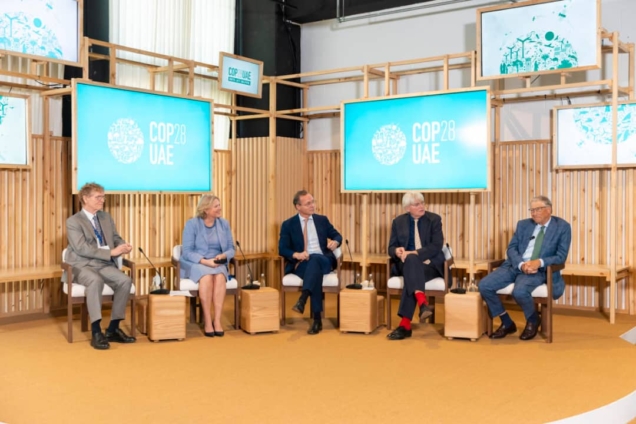A groundbreaking initiative, named AIM4Scale, aimed at supporting the advancement of resilient and low-emission food system innovations and facilitating their transition to a larger scale, has been introduced at COP28.
The announcement of this new mechanism saw the participation of Michael Kremer, the 2019 Nobel laureate in economics, along with Her Excellency Mariam Almheiri, UAE Minister of Climate Change and Environment, and Bill Gates, Co-chair of the Bill & Melinda Gates Foundation.
The Innovation Commission for Agriculture, Food Security, and Climate Change, led by Professor Kremer, is teaming up with the COP28 Presidency to influence the structure of AIM4Scale.
This collaboration includes guiding the selection of innovations backed by robust evidence of their impact and cost-effectiveness, as well as crafting specific, actionable plans to propel these innovations to a broader scale.
Professor Kremer emphasized the global significance of innovation as a public good during an event jointly hosted by the COP28 Presidency and the Bill & Melinda Gates Foundation at COP28.
Professor Kremer highlighted the significance of adapting innovations, refining them through A/B tests, and subsequently scaling them as a means to establish proof of concept and generate global knowledge.
He emphasized the pivotal role of global funding in the development and scaling of innovations, underlining its importance in driving international progress.
“Adapting innovations, refining them through A/B tests, and scaling them provide proof of concept and generates global knowledge that can inform scaling internationally. This means that global funding has an important role to play to develop and scale innovations.”
At the event, Kremer unveiled recommendations for advancing an initial selection of key innovations towards broader implementation and expediting the progress of innovations in their early stages. One of the recommendations said enhanced weather predictions have the potential to provide significantly more precise and timely weather and seasonal forecasts.
There is compelling evidence indicating that farmers adjust their agricultural practices based on accurate forecasts.
Securing regional forecasts for 12 countries with 260-305 million farming families exposed to the Asian monsoon and similar weather systems in Africa is projected to incur a cost of USD 23 million. However, the benefits for farmers are anticipated to exceed this investment by more than a hundred times.
Climate change extends its impact beyond weather, influencing factors such as pests, soil salinity, agricultural markets, and the optimal selection of seeds and other inputs.
The advancement of digital agriculture, expected to expedite the progress of early-stage innovations, offers a means for timely, cost-effective, and potentially tailored delivery of information to enhance farmers' resilience.
Several governments have initiated digital agricultural advisory programs, often collaborating with technical partners to apply human-centered design principles and A/B testing to enhance communication with farmers. India, for instance, has successfully implemented large-scale programs.
The rapid scaling of digital agriculture holds the potential to reach hundreds of millions of farmers.
Further recommendations underscored the importance of training in rainwater harvesting. The guidance emphasized that on-farm rainwater harvesting has the potential to enhance soil quality, increase yields and revenues, and sequester carbon.
Implementing straightforward training sessions can elevate the adoption of harvesting techniques like demi-lunes. Allocating a funding of USD 21 million to scale up such training could positively impact approximately 1.8 million farmers in Burkina Faso, Mali, and Chad, resulting in benefits up to six times greater than the costs.
Another aspect highlighted the significance of microbial fertilizers as an early-stage innovation. These fertilizers leverage bacteria to enhance crops' absorption of nutrients, thereby improving yields and reducing the dependence on synthetic fertilizers. Positioned as an innovation with considerable potential to enhance food security while mitigating emissions, modest funding could facilitate the testing and adaptation of microbial fertilizers in Low- and Middle-Income Countries (LMICs).
Creating a fund designed to invite proposals for the development, testing, and adaptation of innovations related to climate change, food security, and agriculture could play a pivotal role in promoting the adoption of microbial fertilizers among smallholder farmers in Low- and Middle-Income Countries (LMICs). This initiative aims to support the generation of cost-effective innovations with the potential to make a meaningful impact.
The Commission comprises former heads of state and finance ministers, along with leaders in international organizations and civil society, demonstrating a comprehensive and diverse approach to addressing challenges in climate change, food security, and agriculture.
Latest Stories
-
Ghana-Russia Centre to run Russian language courses in Ghana
5 hours -
The Hidden Costs of Hunger: How food insecurity undermines mental and physical health in the U.S.
5 hours -
18plus4NDC marks 3rd anniversary with victory celebration in Accra
8 hours -
CREMA workshop highlights collaborative efforts to sustain Akata Lagoon
8 hours -
2024/25 Ghana League: Heart of Lions remain top with win over Basake Holy Stars
9 hours -
Black Queens: Nora Hauptle shares cryptic WAFCON preparation message amid future uncertainty
10 hours -
Re-declaration of parliamentary results affront to our democracy – Joyce Bawah
10 hours -
GPL 2024/25: Vision FC score late to deny Young Apostles third home win
10 hours -
Enhancing community initiatives for coastal resilience: Insights from Keta Lagoon Complex Ramsar Site Workshop
10 hours -
Family Health University College earns a Presidential Charter
10 hours -
GPL 2024/25: Bibiani GoldStars beat Nsoatreman to keep title race alive
10 hours -
GPL 2024/25 Bechem United keep title hopes alive with narrow win over FC Samartex
11 hours -
2024/25: Dauda Saaka scores as Asante Kotoko beat Dreams FC
11 hours -
M.anifest reflects on galamsey’s devastation 11 years after ‘No Shortcut to Heaven’
11 hours -
We’ll have the last laugh – Sammy Gyamfi slams EC’s “cantata” re-collation
11 hours

